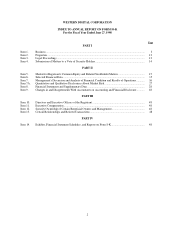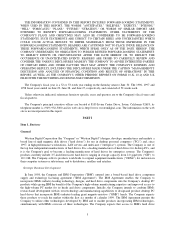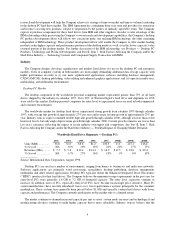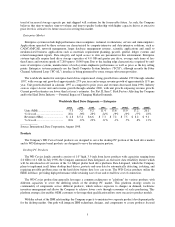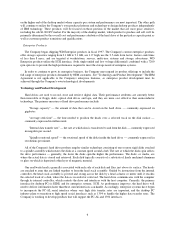Western Digital 1998 Annual Report Download - page 16
Download and view the complete annual report
Please find page 16 of the 1998 Western Digital annual report below. You can navigate through the pages in the report by either clicking on the pages listed below, or by using the keyword search tool below to find specific information within the annual report.
11
Materials and Supplies
The principal components currently used in the manufacture of the Company's hard drives are magnetic heads and
related head stack assemblies, media, controllers, spindle motors and mechanical parts used in the head-disk
assembly. In addition to its own proprietary semiconductor devices, the Company also uses standard semiconductor
components such as logic, memory and microprocessor devices obtained from other manufacturers and a wide variety
of other parts, including connectors, cables, and switches.
Unlike some of its competitors, except for a portion of its media requirements, the Company acquires all of the
components for its products from third-party suppliers. In general, the Company tries to have at least two or three
suppliers for each of its component requirements. For example, the Company currently buys MR heads from IBM,
Read-Rite and SAE. IBM will supply all of the heads for the Company's desktop PC hard drives incorporating IBM
technology under the IBM Agreement. Media requirements not fulfilled internally are purchased through several
outside vendors including Komag, Trace Storage, HMT Technology and Showa Denko. The Company purchases
proprietary finished integrated circuits, which are designed by the Company, from SGS-Thomson and other externally
designed integrated circuits from other sources.
For an additional discussion of component supplies, see Part II, Item 7, Risk Factors Affecting the Company and/or
the Hard Drive Industry — Dependence on Suppliers of Components.
Backlog
At August 7, 1998, the Company's backlog, consisting of orders scheduled for delivery within the next twelve
months, was approximately $270 million, compared with a backlog at August 15, 1997 of approximately $620 million.
Historically, a substantial portion of the Company's orders has been for shipments within 30 to 60 days of the
placement of the order. The Company generally negotiates pricing, order lead times, product support requirements and
other terms and conditions prior to receiving an OEM's first purchase order for a product. OEM purchase orders
typically may be canceled with relatively short notice to the Company, subject to payment of certain costs, or modified
by customers to provide for delivery at a later date. Also, certain of the Company's sales to OEMs are made under
"just-in-time" delivery contracts that do not generally require firm order commitments by the customer until the time of
sale. Therefore, backlog information as of the end of a particular period is not necessarily indicative of future levels
of the Company's revenue and profit and may not be comparable to earlier periods.
Patents, Licenses and Proprietary Information
The Company owns numerous patents and has many patent applications in process. The Company believes that,
although its patents and patent applications have significant value, the successful manufacturing and marketing of its
products depends primarily upon the technical competence and creative ability of its personnel. Accordingly, the
patents held and applied for do not assure the Company's future success.
In addition to patent protection of certain intellectual property rights, the Company considers elements of its
product designs and processes to be proprietary and confidential. The Company believes that its nonpatentable
intellectual property, particularly some of its process technology, is an important factor in its success. Western Digital
relies upon employee, consultant, and vendor non-disclosure agreements and a system of internal safeguards to protect
its proprietary information. Despite these safeguards, there is a risk that competitors may obtain and use such
information. The laws of foreign jurisdictions in which the Company does business also may provide less protection
for confidential information than the United States.
The Company relies on certain technology that is licensed from other parties in order to manufacture and sell its
products. The Company has cross-licensing agreements with several competitors, customers, and suppliers, and the
Company believes that it has adequate licenses and other agreements in place in addition to its own intellectual
property portfolio to compete successfully in the hard drive industry.
From time to time, the Company receives claims of alleged patent infringement or notice of patents from patent
holders which typically contain an offer to grant the Company a license. It is the Company's policy to evaluate each



